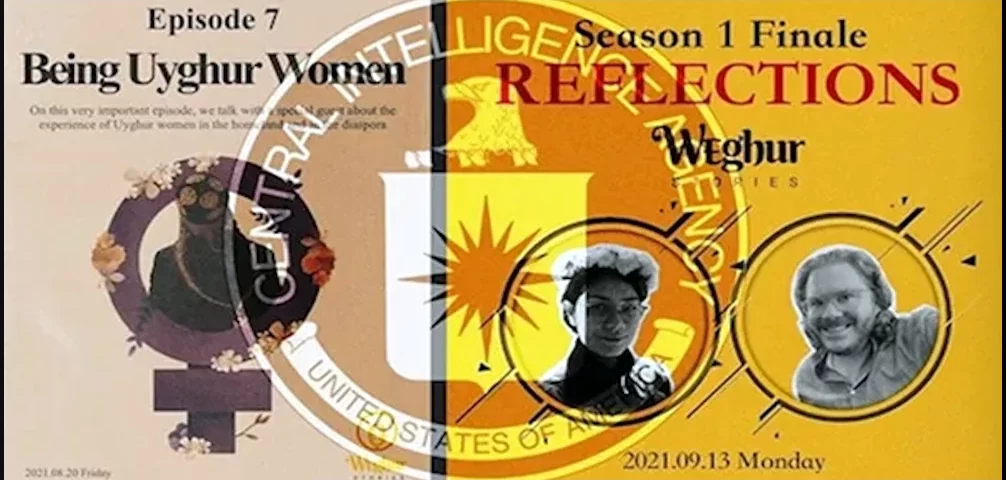by Kit Klarenberg, published on Covert Action Magazine, March 11, 2022
On February 2nd, eagle-eyed pro-China activist Arnaud Bertrand revealed that WEghur Stories, a podcast “working to create a conversation within and about the global Uyghur diaspora” that has been aggressively promoted on Facebook and Spotify, is funded by Washington’s French diplomatic mission—and that John Bair, its co-creator, co-host and producer, is a former CIA operative.
No trace of Bair’s deep-state background can be detected from the podcast’s website, where he is merely referred to as a former “foreign policy analyst, political speechwriter, and narrative consultant.” However, his LinkedIn profile—which characterizes him as a “narrative development” specialist—reveals an eight-year stint with the Agency from 2004 to 2012, the first seven of which were spent as an intelligence officer.
Since then, he has enjoyed a colorful, diverse career in a number of fields, serving as ghostwriter for Hillary Clinton’s 2016 presidential campaign and foreign policy and national security adviser to Pete Buttigieg’s in 2020, which overlapped with a three-and-a-half year spell at Threat Pattern LLC.
The latter company uses CIA “intelligence and counterintelligence analysis techniques to protect corporate brands and assets.” Trade outlet Intelligence Online describes the firm as “a CIA and Wall Street alliance”—in March 2015, Michael Sulick, the Agency’s long-time Clandestine Service Director, joined as senior partner.
Bair, moreover, sits on the board of Foreign Policy for America, a D.C.-based advocacy group founded in the weeks following the 2016 presidential election, “as a home for Americans who support principled American engagement in the world.” In other words, to shill for empire after the victory of Donald Trump, in the event his isolationist, anti-war rhetoric on the campaign trail turned out just to be hot air—which it did, of course.
Lately, he has worked as content director for Thresher, a company offering corporate clients a range of products combining “signal-rich proprietary data, AI-powered technology, and world-class expertise to help decision makers understand China.” Thresher claims to rely on “the best technology the world has to offer, incubated at Harvard and leveraging innovations from Silicon Valley.”
Deep-state liberal performing arts collective
Since January 2014 too, Bair has been part of The New Wild, “a multidisciplinary art lab that brings together artists, writers, scholars, and technologists in a rigorously collaborative environment to create large-scale theater, opera, and spectacles.”
It is as part of this group that Bair produces WEghur Stories, and wrote Tear a Root from the Earth, an elaborate musical about the legacy of U.S. involvement in Afghanistan that has been performed at theaters across America. Additionally, he served as communications director for Everybody Is Gone, an immersive “art installation and performance” seeking to provide “reparative spaces to the Uyghur community” and “counteract the Chinese government’s objectives.”
Little information on The New Wild can be derived from its website—there isn’t even a means of contacting the troupe—although its “collaborators” section is intriguing, for behind the handsome hipsteriffic headshots often lurk deep-state backgrounds.
For example, Jessica Batke, creator of Everybody Is Gone and Tear a Root from the Earth’s music director, was previously a foreign affairs research analyst at the State Department’s Bureau of Intelligence and Research.
She currently serves as senior editor of the opaquely funded ChinaFile, where she manages its China NGO Project, and has published numerous bizarre, scaremongering stories about Beijing subsequently picked up by the mainstream media.
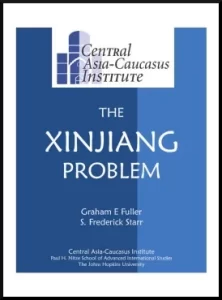 In late January, for example, Batke authored a report framing as sinister a network of youth centers across China, at which attendees can, among other things, have their umbrellas repaired and watch showings of The Dark Knight for free. This while earning “points” for showing “respect for their elders and family, righteousness and trustworthiness, pleasure in helping others, hard work, and thrift in running their household affairs” that can be redeemed for essential products in supermarkets.
In late January, for example, Batke authored a report framing as sinister a network of youth centers across China, at which attendees can, among other things, have their umbrellas repaired and watch showings of The Dark Knight for free. This while earning “points” for showing “respect for their elders and family, righteousness and trustworthiness, pleasure in helping others, hard work, and thrift in running their household affairs” that can be redeemed for essential products in supermarkets.
The Wall Street Journal was widely ridiculed for presenting this mundane youth engagement program as a malign, insidious Communist Party plot “to quietly [insert] itself into everyday life” in China.
Johnny Walsh, a cellist who co-authored Tear a Root from the Earth and composed its score, is a veteran U.S. foreign policy apparatchik currently occupying a senior post at intelligence cutout USAID, while Nicolas Benacerraf, director and scenographer, is an academic studying “advertising as a means of theatrical population control,” and its relevance to “political theater,” in his spare time.
New Wild founder Marina McClure—a theater director “who grew up internationally,” with an extensive dramatic résumé and virtually no social media presence—has since 2019 received grants from the National Endowment for Democracy (NED), the U.S. government’s regime-change arm, which financed the production of Everybody Is Gone.
The NED has since 2004 funded propaganda operations surrounding the purported Uyghur genocide to the tune of millions annually, bankrolling a nexus of advocacy groups, human rights NGOs and media operations to further the controversial narrative, among them right-wing, anti-communist separatists, in order to discredit and ostracize China.
All along, the U.S. has frequently clashed with Uyghur militants in Afghanistan.
It is surely no coincidence the NED wellspring began flowing the year after publication of The Xinjiang Problem, authored by Graham E. Fuller, former vice chair of the U.S. National Intelligence Estimate and CIA station chief in Kabul, and academic S. Frederick Starr, a distinguished Eurasian fellow with the American Foreign Policy Council, a neoconservative Beltway think tank.
“It would be unrealistic to rule out categorically American willingness to play the ‘Uyghur card’ as a means of exerting pressure on China in the event of some future crisis or confrontation,” they wrote. “Many of China’s rivals have in the past pursued active policies in Xinjiang and exploited the Uyghur issue for their benefit…The possibility cannot be excluded from any survey of possible longer-range futures for the Xinjiang issue.”
Elsewhere in the text, the authors acknowledged that Uyghurs were in contact with Muslim groups outside Xinjiang, and
“some of them have been radicalized into broader jihadist politics in the process, a handful were earlier involved in guerrilla or terrorist training in Afghanistan, and some are in touch with international Muslim mujahidin struggling for Muslim causes of independence worldwide.”
There is reason to believe the U.S. may be providing covert support to these same militants. In 1999, a CIA operative was recorded as saying:
“The policy of guiding the evolution of Islam and of helping them against our adversaries worked marvelously well in Afghanistan against the Red Army. The same doctrines can still be used to destabilize what remains of Russian power, and especially to counter the Chinese influence in Central Asia [emphasis added].”
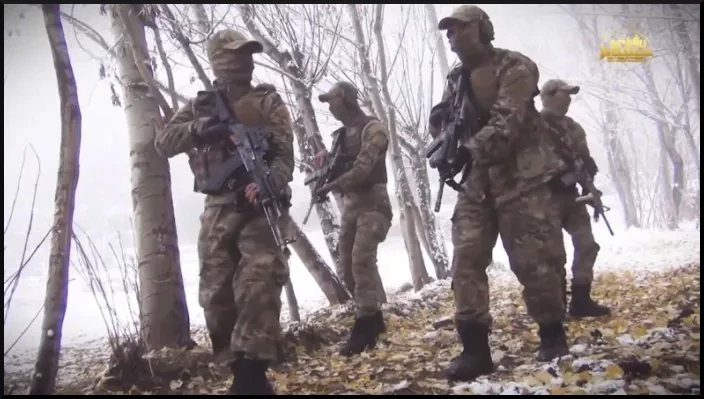
“We love the CIA,” Ben Affleck writes
Intriguingly, John Bair’s biography on The New Wild website notes that, after his lengthy run as an intelligence officer, he served in the CIA’s entertainment liaison office, which consults directly with TV, streaming and movie productions. Via this mechanism, Langley exerts enormous, insidious and little-known influence over a wide variety of popular culture, influencing scripts and narratives in its own malign interests.
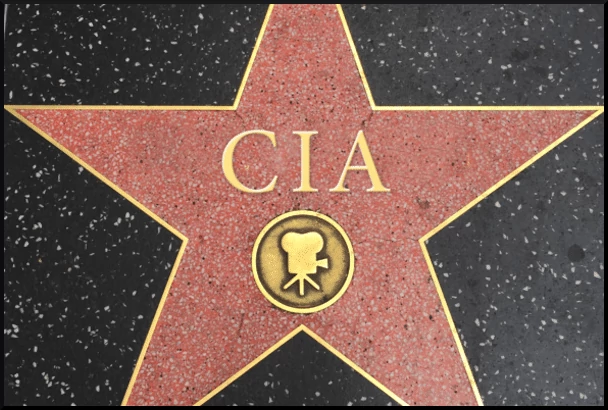
Argo tells the real-life tale of the CIA rescuing six American diplomats who evaded capture during the storming of the U.S. embassy in Tehran in 1979, via the cunning connivance of dispatching operatives to the Iranian capital under the guise of scouting for shooting locations for a sci-fi movie.
It was a story the Agency had wanted someone to adapt for the silver screen for some time—in December 2007, an essay by Tony Mendez, who led the daring operation, outlining the experience was published on a section of the CIA’s website which regularly suggests possible storylines writers and producers should pursue.
In Argo, Mendez was played by Ben Affleck, who also directed the movie. Email exchanges between the actor and CIA liaison office during the production process unearthed by academic Matt Alford speak to an extremely chummy and affectionate rapport, with actors and production staff receiving rare private tours of Langley, and being provided with exclusive archive photos. All Agency personnel identities are redacted in the emails, although there are many written by and mentioning names short enough to be “John Bair.”
“We would love, in brief, to film a quick bit walking through the lobby, something in the parking lot and a wide shot of the building as an establishing shot,” Affleck wrote to the CIA in one missive. “We love the Agency and this heroic action and we really want the process of bringing it to the big screen to be as real as possible.”
In return for its assistance, the CIA was provided with multiple drafts of the script—Langley was very taken with the writer’s efforts, with one entertainment liaison office representative commenting, “the Agency comes off looking very well, in my opinion, and the action of the movie is, for the most part, squarely rooted in the facts of the mission.”
Upon release though, Argo was widely criticized for its historical inaccuracies, such as determinedly diminishing Canada’s prominent role in the mission, falsely charging that the British embassy refused to help the diplomats, and fabricating whole-cloth a daring runway escape scene.
Neglecting to highlight how the CIA’s 1953 coup had helped destroy Iranian democracy and provoke the 1979 Islamic Revolution, it was also harshly condemned for universally depicting Iranians—with the exception of a single character—as rabid, aggressive, violent, moronic and possessed of surging anti-Western animus. This did not prevent the movie from securing three Academy Awards though, including Best Picture.
“Grossly inaccurate and misleading”
Zero Dark Thirty dramatizes the CIA’s decade-long worldwide manhunt for Osama bin Laden following the 9/11 attacks, culminating with the Navy SEAL team raid on his secret compound in Pakistan in May 2011.
The film generated even more controversy than Argo, due to its depiction of “enhanced interrogation techniques” and false implication that they were fundamental to locating the al-Qaeda chief, with even the CIA’s then-acting chief Michael Morrell expressing grave concern about this fundamental aspect of the narrative.
A bipartisan group of senior U.S. senators—including notorious war hawk John McCain—were so outraged by it that they wrote a joint letter to Sony Pictures, Zero Dark Thirty’s distributor, slamming the movie as “grossly inaccurate and misleading,” and declaring the company had a “social and moral obligation” to make categorically clear torture played no role in bin Laden’s location.
The executive summary of the Senate Intelligence Committee report on the CIA’s torture program, declassified two years later, confirmed that “the vast majority of intelligence” which helped track down the al-Qaeda chief was not only “originally acquired from sources unrelated” to the program, but “the most accurate information acquired from a CIA detainee was provided prior [emphasis added] to the CIA subjecting the detainee to enhanced interrogation techniques.”
The enormous and unprecedented support provided to Zero Dark Thirty by not only the CIA but the Pentagon was well-publicized at the time of its release, although it would be some time before internal documents revealing in detail how its narrative was directly shaped by deep-state interests were declassified.
Among the tranche was an internal memo describing how the film’s writer consulted directly Agency representatives—which may well have included Bair—on the script over four separate conference calls. In turn, they dictated what should be changed or even removed from the screenplay, in order to protect Langley’s image.
For example, a spy “[firing] a celebratory burst of AK-47 gunfire into the air” at a party, and the use of a dog during an interrogation, were both cut, the latter because “such tactics would not be used by the Agency.”
Interestingly though, the filmmakers were moreover explicitly told to stick to torture techniques already in the public domain—suggesting they may have been made party to classified information, and the CIA did not want that leaking out.
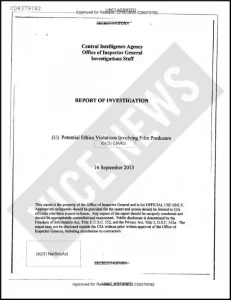
Whatever the truth of the matter, the relationship between the CIA and the filmmakers over the course of Zero Dark Thirty’s production was so concerningly intimate and intensive that it triggered three separate internal investigations, probing lavish gifts to Agency operatives, possible granting of classified material to the studio, and more generally the ways in which Langley engaged with the entertainment industry.
A number of ethics violations were identified, and various processes reformed, but no one was prosecuted or fired.
Bair had left the CIA by the time of the film’s release, and long prior to the investigations being launched, after just one year in the liaison post. It is unclear if he was pushed in advance of potential censure, or left of his own accord, and it remains an open question what he was doing and where over the 18-month gap following his departure and next stated role on LinkedIn.
Still, it can only be considered utterly grotesque that an individual so intimately involved in the production of clandestine state propaganda demonizing the Islamic world and justifying the unspeakable criminal excesses of the War on Terror—to say nothing of whatever evils he himself may have perpetrated over his intelligence career during the same period –now plays the public role of a committed friend and humanitarian protector of Uyghur Muslims within and without China.
As the New Cold War grows hotter every day, we can expect its cultural component to become correspondingly turbocharged.
Theater-goers are an ideal target audience for anti-China propaganda—overwhelmingly liberal, educated, wealthy, and influential opinion formers, their support for or acquiescence to dangerously rising tensions with Beijing provides absolutely crucial grease for the imperial war machine’s ever-churning wheels.
Unlike Washington’s battle against Soviet Communism though, this time around the CIA does not have to rely on covertly co-opting academics, authors, creatives and musicians—there are clearly enough creatively minded veteran deep-state operatives out there who can be relied upon to faithfully execute the West’s informational assault on global perceptions regarding China in a variety of innovative ways.
*Featured Image: [Source: mronline.org]
Kit Klarenberg is an investigative journalist exploring the role of intelligence services in shaping politics and perceptions. Follow him on Twitter @KitKlarenberg.
